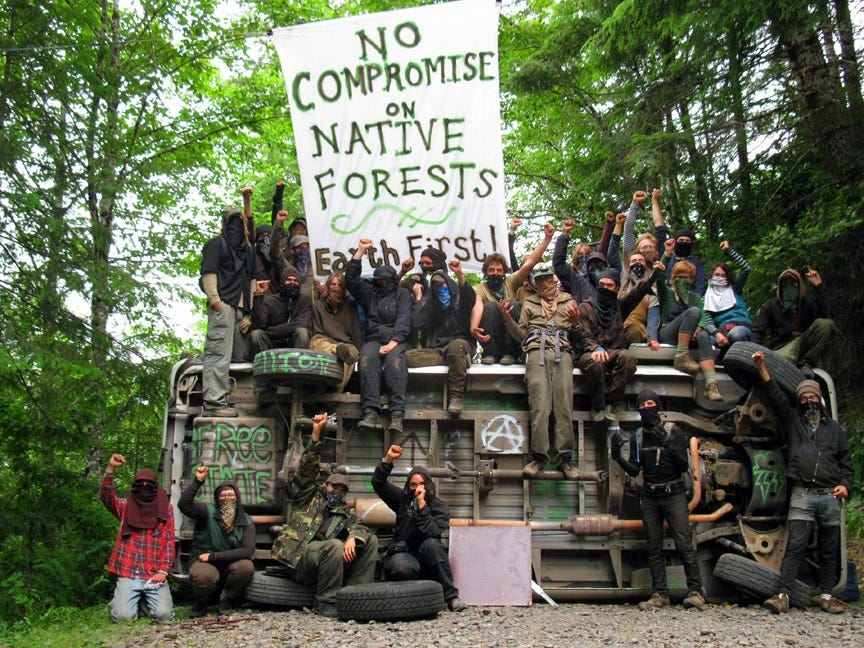What happened in the wider world happened in obscure far left sectarian spaces first; what happened to those spaces will eventually happen to the wider world. Watching the memeplex grow from a few droplets to a raging flood engulfing the nation was a surreal experience for those in a position to witness it. One such witness speaks of it in the testimonial to follow.
By Joseph Keegin
Joseph M. Keegin is a PhD student in philosophy at Tulane University and an editor at The Point.
On a hot August afternoon in 2007, in an old growth forest in southern Indiana, I first heard the word “privilege” wielded in a strange new way that heralded a strange new world in the making.
It was at a workshop on “ecofeminism” at the annual summer meeting of Earth First!, an environmental activist group that called for the sabotage of industrial machinery in defense of wilderness. Most of the other classes were on practical matters, such as how to climb trees, skin and tan deer hides, block logging roads or spike trees to halt deforestation. I attended what I assumed would be a lecture on the connection between ecology and the lives of women. I was wrong. We instead were instructed in a new way of viewing the world and one another through the lens of “privilege.”
The new lens constituted a frontal assault on all of our most deeply held principles. We were anarchists. We opposed capitalism and environmental degradation in the service of romantic ideals of freedom and passionate friendship. “Another world is possible,” we insisted; “we carry a new world in our hearts,” one based upon free association, mutual aid, and—perhaps above all—finding pleasure in the act of sociality. But according to the theory of privilege—itself but one part of a larger critique of “oppression,” the new standard by which all social phenomena would come to be judged—this freedom and mutuality we hoped we’d achieved with one another was a smokescreen for deeper, more sinister forms of exploitation. Free association, we were told, was a myth: one could never be truly free of the complex machinery of power, fueled by the bodies of the oppressed, that forces us into the zero-sum game we play called society.
It was a puzzling adjustment of the political frame. I was a working-class college dropout from the trailer park looking to build a better and more convivial world with others, no matter the “identities” or backgrounds of my comrades. I’d spent enough of my school years being bullied by rich girls to know that facts about my anatomy could not plausibly categorize me as an “oppressor,” and spent enough time living alongside fellow “trailer trash” to know that “white privilege” could not possibly provide an exhaustive explanation of American politics and culture in the new millennium. I’d been seduced into anarchism by the promise of human togetherness beyond the parochialisms of identification foisted upon me, my friends, and my family by petty schoolyard tyrants, government bureaucracies, and random assholes alike—but now it seemed this promise was being revoked. Nonetheless, I didn’t take it too seriously. I nodded along with the rest, all of us unaware that this one little workshop was but a raindrop of a quickly gathering storm.
The anarchist milieu of the late 90s and early 2000s was vibrant, creative, and diverse. The 1999 WTO protest in Seattle—perhaps the high point of the turn-of-the-century anti-globalization movement, in which much-televised black-clad anarchists joined tens of thousands of environmentalists, union members, and others to disrupt the World Trade Organization’s conference on economic globalization—did as much to distort the reality of the anarchist scene as it did to promote it. For every brick-throwing, ninja-costumed freedom fighter, there were a dozen other “anarchists” who eschewed open confrontation with agents of capital and lived out their politics by hosting dinner parties, learning about plants, or making art. Turn-of-the-century anarchism was less a set of political beliefs than a world unto itself: a person could live nearly their entire life patronizing anarchist institutions, participating in anarchist activities, interacting primarily—if not only—with anarchists speaking the language of anarchism. A traveler to an unknown city could plug into the local anarchist network and expect food, fellowship, and a place to stay; if the scene was particularly vibrant, there may even be a coffee shop or bookstore to read in during the day and a punk show to dance and flirt at by night. Anarchism was a “thick community,” in that common bastardization of Geertz’s phrasing, with all the benefits and disadvantages that attend such an arrangement. But that it was something living and thriving was undeniable.
But then something changed. Anarchism had always been an agonistic enterprise, marked by an atmosphere of discussion and debate, but under the influence of the new doctrines that began impinging on anarchist life, it gradually took on the air of denunciation and schism. And the principle at the bottom of this change was “oppression.” The volunteers at an anarchist bookshop or at an environmental activist retreat might articulate their goals as opposing war, protecting wilderness, human liberation. They might help with a Books to Prisoners project, sending reading material to people languishing behind bars, or cook vegan meals for their friends and the homeless with their local Food Not Bombs. But suddenly, as if overnight, the emphasis changed, and the grand political ambitions at the scale of the world dissolved into talk about dismantling structures of oppression at home.
Articles about race, sexuality, gender, and the urgency of “anti-oppression” theory began appearing in the Earth First! Journal in 2006. Before that point, the Journal had served primarily as a vehicle for calls to action, agitprop, updates about various regional campaigns, and other internal banter for militants engaged in illegal political activities. Then in 2007, it published a full-page “Anti-Oppression Policy,” perhaps the first of its kind from an anarchist organization. (Similar documents published by university social work programs, government welfare agencies, feminist nonprofits, and Unitarian Universalists can be found from as early as 2000.) Its language is markedly bureaucratic, a noteworthy shift from the periodical’s usual self-seriously romantic tone, and includes the kinds of subheadings you’d expect in a nonprofit or marketing whitepaper: “Definition,” “Goals,” “Forming a Process.” CrimethInc., the principal organ of poetic “lifestyle” anarchism, followed suit in 2009: “Oppression and privilege intertwine in extremely complex ways,” they write; “racism, classism, heterosexism, ageism, and others overlap and extend into all spheres of our lives.” A far cry from their earlier rhetoric, of desiring to “write the lines that could ignite the fires dormant in the multitudes around us.”
And on the ground, outside the journals, the trend was the same. Workshops on “internalized oppression” proliferated; erstwhile planning meetings became venues for grievances and discussion about how to carry out “accountability processes” for sexual and political infractions; spaces and activities segregated by race and gender became the norm at conferences and campouts. People who had once interacted as friends, lovers, or comrades began to sort into a different clusters of committees and working groups—on inclusivity, sexual assault, anti-racism, and so forth—that sprung up like mushrooms after a spring rain. Concern about police infiltration and the possibility of agents provocateurs quickly became overwhelmed by zeal for rooting out “dudebros” in the midst. Friendly collaboration, which had been the warp and woof of the anarchist DIY ethos, had been broken; belonging became a matter of “identity,” not of the particular, all-too-mysterious appreciation one person feels for another, or a group feels toward itself. Our little world, once rich and life-giving, became a place of division, hostility, and loneliness.
To many reading this, the story will sound familiar—if not completely mundane. These kinds of changes have been unfolding throughout American society over the last few years under the banner of “Diversity, Equity, and Inclusion”—what detractors sometimes call “wokeness.” But the destruction this trend wrought among the anarchists occurred years before it found any foothold in the larger culture.
Keep reading with a 7-day free trial
Subscribe to Year Zero to keep reading this post and get 7 days of free access to the full post archives.






